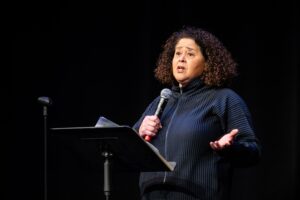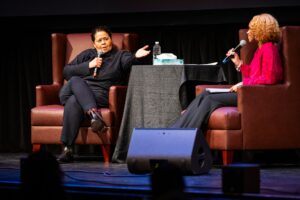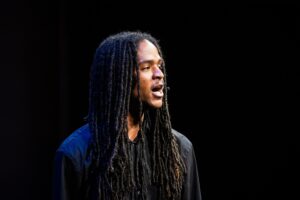Noted writer and actress Anna Deavere Smith delivers powerful remarks to a rapt audience
The annual 2024 MLK Symposium at UW–Madison took place with a sense of urgency and an air of renewed commitment, as speakers and participants alike spoke of the need to remember Dr. Martin Luther King Jr.’s words and heed his call for vigilance in the fight for social justice. At a time when those seeking to advance diversity, equity and inclusion are facing many challenges, the need for everyone to play a part in creating a welcoming environment for all was a theme throughout the event. More than 350 guests were in attendance at Wisconsin Union Theater’s Shannon Hall, with an additional 150-plus people viewing the event online.
The symposium, co-hosted by UW–Madison’s Student Affairs and the Division of Diversity, Equity and Educational Achievement (DDEEA) in partnership with the Wisconsin Union Theater, celebrates King’s legacy and each year features a speaker who reflects upon how his teachings have informed that person’s work or life experience.

This year’s keynote speaker, Anna Deavere Smith, more than delivered on that goal. A writer, actress and teacher, Smith is known to many for her mainstream television and film roles. However, she has a rich portfolio of award-winning plays, books and other writings that delve into themes of race relations and history and cut to the very heart of the social justice issues facing us today. Her remarks at the symposium did not disappoint, as she shared how King’s words from six decades ago are relevant now and have been infused throughout her work over the course of her career.
Smith invoked King’s greatest legacy immediately upon taking the stage, asking the audience, “What are you willing to fight for?” She asked the crowd what they were willing to give up or sacrifice in order to make change, and reminded them that King’s name was synonymous with ‘courage.’ He “gripped the conscience of the nation” with his words and with his bravery.
By way of example, Smith read at length from King’s famous “Letter from Birmingham Jail,” written while he was imprisoned for leading peaceful protests that were considered illegal. He wrote to eight white clergy members who had criticized his non-violent but sometimes illegal methods of resistance. Written on paper smuggled into the jail, King made a distinction between just and unjust laws, arguing that unjust laws must be resisted – just as they had been throughout history. He embraced the label of ‘extremist,’ asking “Was not Jesus an extremist for love?” He asked, “Will we be extremists for hate or for love?” He was disappointed in ‘white moderates,’ and had hoped that they would see the need for more forceful activism in the face of such prejudice.
Smith ended her presentation with a compelling retelling of her interview with Bryan Stevenson, executive director of the Equal Justice Initiative – one of hundreds of interviews she has conducted in order to better understand people from all walks of life. Stevenson talked about the injury that injustice – going back to his childhood – had exacted upon him, and how one must recover from it.
Following her remarks, Smith participated in a Q&A session with student moderator Kamyia Denson. During the discussion, Smith advocated for bringing together people of differing opinions and urged the audience to “hear what you don’t agree with.”

King’s teachings were echoed by the other speakers at the symposium.
“Unless we recognize the origins of the injustices we see today, we will be ill-equipped to make lasting change,” said LaVar J. Charleston, deputy vice chancellor and chief diversity officer, who leads the DDEEA. “While it can be uncomfortable to illuminate ugly truths, these truths help us avoid repeating the mistakes of the past. We must relentlessly carry the torch of justice into spaces that threaten to drive out the very memory of things we’ve accomplished and keep us from further progress.”
Lori Reesor, vice chancellor for student affairs, reflected on the importance of community and about what it means to belong at UW–Madison. “Belonging was a common thread in [King’s] work as well,” Reesor noted. “He didn’t just want people to co-exist – he wanted them to feel like they belonged in all spaces. We share this belief. Staying in conversation and in community allows us to be honest about who we are today – as a university and as human beings – so that we can chart a path forward that’s grounded in empathy and shared purpose.”
Reesor’s remarks were followed by those from Chancellor Jennifer L. Mnookin, who noted that King’s first visit to campus was in the very same space where the audience was sitting. She talked about his return visit, in 1965, at the invitation of students, where he “told a crowd of 3,000 packed into the Stock Pavilion that what this nation needed was ‘door-opening determination’ in the struggle for civil rights.” Mnookin went on to say that King “recognized that this campus was – as it is today – a place of door-opening determination. A community of outstanding scholars from far and wide who have come here to make a difference in the world . . . I think he might also tell us – as he said at the March on Washington – that we ‘cannot walk alone.’”

The symposium began with a spoken-word reenactment of the auctioning of an enslaved woman performed by Kaleb Autman, a student artist with the First Wave Hip Hop and Urban Arts Scholarship Program. Autman’s performance was part of a larger campus commitment to honor King’s legacy, and included service and other activities throughout January and is continuing through February’s Black History Month. This past month included the MLK Day of Service and Educational Opportunity, sponsored by the PEOPLE Program housed within the DDEEA. Fifty high-school students from Madison and Milwaukee spent the day volunteering with Feeding America and then visited America’s Black Holocaust Museum in Milwaukee.
The Black Cultural Center, which is part of the Multicultural Student Center in Student Affairs, is sponsoring a wide range of activities throughout February to commemorate Black History Month. The student planning committee has organized events such as “Protect Your Crown,” which celebrates hair empowerment and cultural appreciation; a program highlighting the history of Black students on campus; and numerous free film screenings including Oscar-winner “Moonlight” and “If Beale Street Could Talk,” based on James Baldwin’s novel of the same name. Also taking place are several open-mic nights on campus. A full list of events and activities can be found here.
The symposium concluded with a community reception in Memorial Union’s Sunset Lounge, where inspired and energetic guests continued the conversation.
Next year’s MLK Symposium will be held January 28, 2025.
This article was written by Amy Weitz for the Division of Diversity, Equity & Educational Achievement, Student Affairs, and Wisconsin Union Theater.